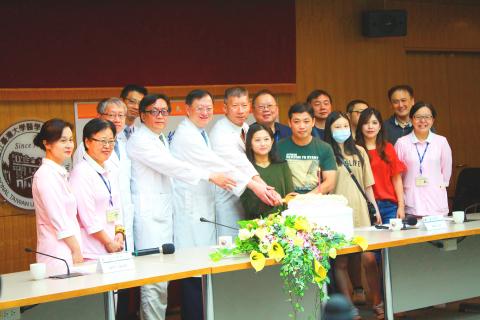National Taiwan University Hospital (NTUH) yesterday said that it has carried out a heart transplant on a woman whose heart had stopped beating 50 days before, marking a new record in the nation.
The 38-year-old woman surnamed Chen (陳) was in October last year stung by a bee while visiting Japan and she developed an acute fever and heart failure that led to cardiac arrest shortly after she returned to Taiwan.
The hospital immediately applied extracorporeal membrane oxygenation (ECMO) and waited for a suitable donor heart for transplant, as four available donor hearts were incompatible.

Photo: CNA
NTUH Cardiovascular Center director Chen Yih-sharng (陳益祥) yesterday said that the woman had acute myocarditis caused by an allergic reaction to the bee sting and her heart was barely beating when she was hospitalized.
After a cardiac ultrasound showed that her heart was hardly functioning, two ECMO systems were used to keep her alive while waiting for a transplant, he said.
She had complications — including acute kidney failure and small blood vessel blockage due to blood clots — during the wait, so the surgical team had to come up with a desensitization plan to remove harmful antibodies from her blood to reduce the risk of her body rejecting a transplant, he added.
“We had to use immunological methods to desensitize her body to reduce the risk of transplant rejection, but it was not totally without danger, because the use of immunosuppressive agents might lead to infections,” Chen Yih-sharng said.
A transplant was finally completed in December last year and the new heart has been functioning properly over the past six months, he said.
The woman could have had a stroke at any time during the waiting period and the surgical team had growing concerns that she would remain in a vegetative state even after the transplant, Chen Yih-sharng said, but added that she still demonstrated slight reactions, a computed tomography scan showed no cranial bleeding and her family was very supportive.
The woman yesterday said that at the time, she could hear sounds around her, but could not move her body.
Noting that at the time she needed transfusions of up to 3 liters of blood per day, she expressed gratitude to all involved in saving her life.
The woman’s husband, surnamed Chin (秦), said that at first, after being informed of the situation in the intensive care unit, he could not accept that his wife’s heart had stopped beating.
However, because he did not want to give up hope, he said that he visited and talked to her several times a day while she waited for a donor heart.
The average waiting period for a heart transplant at NTHU is about 40 days, Chen Yih-sharng said.
Family support was also very important, because it allowed the surgical team to put all their efforts into saving the woman, he added.

Conflict with Taiwan could leave China with “massive economic disruption, catastrophic military losses, significant social unrest, and devastating sanctions,” a US think tank said in a report released on Monday. The German Marshall Fund released a report titled If China Attacks Taiwan: The Consequences for China of “Minor Conflict” and “Major War” Scenarios. The report details the “massive” economic, military, social and international costs to China in the event of a minor conflict or major war with Taiwan, estimating that the Chinese People’s Liberation Army (PLA) could sustain losses of more than half of its active-duty ground forces, including 100,000 troops. Understanding Chinese

The Ministry of Foreign Affairs (MOFA) yesterday said it is closely monitoring developments in Venezuela, and would continue to cooperate with democratic allies and work together for regional and global security, stability, and prosperity. The remarks came after the US on Saturday launched a series of airstrikes in Venezuela and kidnapped Venezuelan President Nicolas Maduro, who was later flown to New York along with his wife. The pair face US charges related to drug trafficking and alleged cooperation with gangs designated as terrorist organizations. Maduro has denied the allegations. The ministry said that it is closely monitoring the political and economic situation

UNRELENTING: China attempted cyberattacks on Taiwan’s critical infrastructure 2.63 million times per day last year, up from 1.23 million in 2023, the NSB said China’s cyberarmy has long engaged in cyberattacks against Taiwan’s critical infrastructure, employing diverse and evolving tactics, the National Security Bureau (NSB) said yesterday, adding that cyberattacks on critical energy infrastructure last year increased 10-fold compared with the previous year. The NSB yesterday released a report titled Analysis on China’s Cyber Threats to Taiwan’s Critical Infrastructure in 2025, outlining the number of cyberattacks, major tactics and hacker groups. Taiwan’s national intelligence community identified a large number of cybersecurity incidents last year, the bureau said in a statement. China’s cyberarmy last year launched an average of 2.63 million intrusion attempts per day targeting Taiwan’s critical

‘SLICING METHOD’: In the event of a blockade, the China Coast Guard would intercept Taiwanese ships while its navy would seek to deter foreign intervention China’s military drills around Taiwan this week signaled potential strategies to cut the nation off from energy supplies and foreign military assistance, a US think tank report said. The Chinese People’s Liberation Army (PLA) conducted what it called “Justice Mission 2025” exercises from Monday to Tuesday in five maritime zones and airspace around Taiwan, calling them a warning to “Taiwanese independence” forces. In a report released on Wednesday, the Institute for the Study of War said the exercises effectively simulated blocking shipping routes to major port cities, including Kaohsiung, Keelung and Hualien. Taiwan would be highly vulnerable under such a blockade, because it